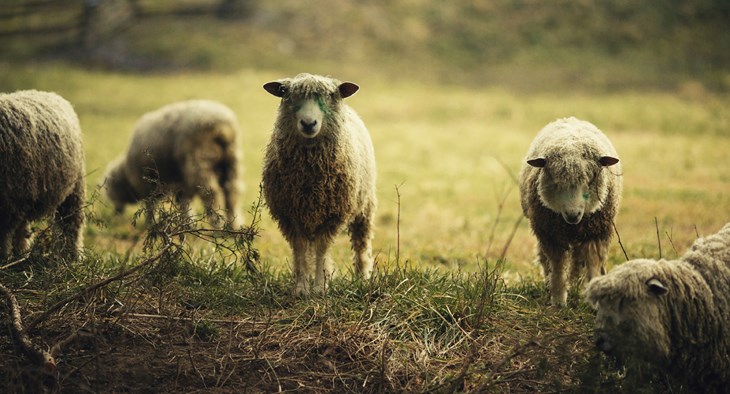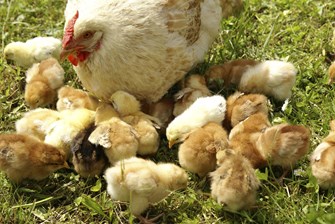Published 12/06/2015
From "black sheep" and "cash cow" to "pig's ear" and "chicken feed", references to farm animals are everywhere in the English language. But what do these expressions reveal about how we relate to the animals we've relied upon for centuries?

We might use these common livestock-related expressions without a second thought, but they are heavily laden with significance.
Slang with significance
On one level, their prevalence in our vocabulary suggests the huge value society has attributed to farm animals throughout history. They have been so much a part of our everyday life that they’ve become intimately woven into the fabric of our language.
But when you look more closely, these farm-focused phrases often reveal a deeply held disrespect for the animals to whom we owe our very survival as a species; the animals who have long been a central part of our countryside, culture and cuisine.
Here, we deconstruct some of the best-known examples and explore how they could be seen to devalue farm animals in society and perpetuate the sort of disregard that allows factory farming to thrive.

Chickens
“Chicken out”, that well-worn idiom meaning to wriggle out of something through fear or weakness, firmly frames the birds who provide much of the world’s meat as wimps.
A variant, to “play chicken”, describes a game of nerves in which the loser is labelled “chicken”, while “chicken feed” denotes a trifling amount of money, which probably reinforces the insignificant place of these birds in society.
And while “chickens come home to roost” – meaning that wrongdoings always catch up with the wrongdoer – bears no similarity to the cowardly, inferior connotations explored above, it likens these birds to a curse, which is hardly flattering, when you think about it.

Cows
The term “cash cow” – a business-related catchphrase describing a product or service that produces a steady flow of cash – is interesting in that it immediately sets up a subject-object relationship between human and cow. In other words, the human profits from the cow, who has no control over its existence.
Then there’s the derogatory American word “bullshit”, which is routinely tossed about in Hollywood films. Meaning “false”, “foolish” or “trivial”, this clipped expression frames one of nature’s greatest fertilisers (when applied in the right quantities!) in distinctly negative terms.

Pigs
But it’s pigs who seem to get the worst linguistic abuse. Belittled and berated at almost every turn (except “as happy as a pig in clover” and other such rare similes), these animals are the butt of many a mocking English expression.
You “eat like a pig”, you’re “as fat as a pig” and you “sweat like a pig”. If you’re selfish, you “hog” something; if you’re horrible, you’re a “swine”. As a description of humans, “pig” can mean fat, filthy, lazy, ugly, disgusting, obstinate, ignorant, sexist or selfish.
But it doesn’t end there. The ears of this poor, beleaguered animal get rather a linguistic bashing, too. It’s said that “you can’t make a silk purse out of a sow’s ear”, which implies that something of poor quality cannot be improved, and when you do something badly, you make “a pig’s ear of it”. All very ironic for such intelligent, clean animals – with very neat ears, at that!
The black sheep of the (animal) family
To make use of a final idiom, it seems that farm animals are the “black sheep” of the animal kingdom when it comes to their browbeaten place in our vocabulary.
As Christine Ammer, the language-focused American writer, says: “Unfortunately, ‘farm’ does often have a negative or diminutive context. It’s not always flattering to talk about farming.”
And it’s true. Compare our findings here to horse-related idioms, say, and you’ll notice the “strong”, “wild”, “steady”, “hungry” associations conjured up by the latter.
All animals are not born equal
This quick analysis of farm-animal idioms throws up some fascinating points, and reinforces the fact that many see farm animals as inherently different to pet cats or dogs (on that point, why do farm animals get “feed” when pets get “food”?).
It’s obviously a minor symptom of a much broader problem about the value that we place on farm animals, and goes some way to help explain why farm animals continue to be raised in factories rather than farms.
But despite this linguistic lambasting, things are changing for the better. An ever-increasing number of people, governments and businesses are recognising that we need to end factory farming, supporting farmers who truly care for their animals. And for that reason, we’re happy as pigs in clover (sorry).
Help us end factory farming for good.
Submit your email address to allow Compassion in World Farming to send you urgent campaign actions and news (you can unsubscribe at any time).
